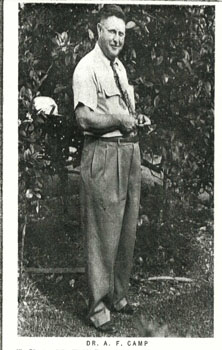
Dr. Arthur Forrest Camp (1896-1982)
Inducted 1974
Highlights
Lake Alfred Research & Education Center
Mediterranean Fruit Fly
Spraying & Fertilizer
Tristeza Virus
Bio
Arthur Forrest Camp was born in Los Angeles, California, on April 13, 1896. Camp earned his Bachelor’s Degree from the University of California and later received his Doctorate of Philosophy in Plant Pathology from Washington University in St. Louis. After graduation Camp joined the horticulture department at the University of Florida. His first assignment was at the university’s newly created citrus research station at Lake Alfred (now known as the Citrus Research and Educational Center). In 1929 Camp was promoted to chair of the department. The next year Camp joined with the United States Department of Agriculture scientists and participated in the work that lead to the eradication of the Mediterranean fruit fly. Camp served with the Department of Horticulture until 1936 when he was named the Horticulturalist in Charge of the Citrus Experimental Station at Lake Alfred.
While working in the Citrus Experimental Station, Camp developed a coordinated system of spraying and fertilizing which is credited with increasing per-acre citrus tree production. Camp was also instrumental in preventing the Tristeza Virus from taking hold in Florida and decimating the citrus industry. In 1944, Camp was named the Vice-Director of all agriculture experimental stations in the state. He served in this capacity until he retired on December 30, 1956. The next year he was elected President of the Florida State Horticultural Society.
Throughout his career, Camp went on many missions to various countries. He was constantly studying agricultural problems and providing counseling, all with the ultimate goal of protecting andp promoting the Florida agricultural industry. He authored over 100 publications that are still relevant to horticulturalists and home users today.
In 1974, Camp was honored by the citrus industry when he was inducted into the Florida Citrus Hall of Fame. Camp died in 1982. He is remembered as one of the top authorities on citrus, tropical and subtropical crops.
